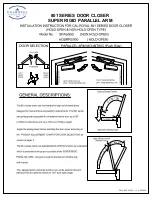
21
OPERATION
1.
These machines have 6 welding
positions (see the table which
follows) in which to regulate current
for various conditions, obtainable
through a combination of one 2 -
position (Min-Max) switch (A, Fig11)
and one-3 position switch (B, Fig11).
2.
The selection of a welding position
is determined by the thicknessof the
metal to be welded. The thicker it
is, the higher the current must be.
3.
According to the thickness to be
welded, the amount of gas
regulated to the work also varies
and must be adjusted accordingly.
4.
For welding adjustments, refer to
the Wire Specification Chart which
follows.
WARNING
(i)
Make sure all flammable materials are removed from the work area.
(ii) Never look directly at the welding arc, it can seriously damage your
eyes. Always use an approved welding mask or helmet.
(iii) Wear protective clothing so that all skin areas are covered.
(iv) Keep a fire extinguisher handy.
Tuning The Welder
The tuning of a Mig welding machine requires some practice, due to the fact
that - contrary to the arc welding procedure - two parameters must be
accommodated to achieve a perfect weld. These are:
(A) Wire Feed Speed
, and
(B) Welding Voltage.
It is important to arrive at the correct combination to suit the type and thickness
of material to be welded. The current necessary for welding is directly dependent
upon the wire feed speed. Wire speed is adjusted by turning the adjuster C,
Fig11.
If the wire feed speed is increased, the current is also increased, but the arc
length is decreased. Conversely, if the wire feed speed is decreased, and current
is therefore decreased, the length of arc is increased.
Increase of the welding voltage leads to a longer arc (without substantially
affecting the current). Conversely, a decreased welding voltage results in a
shorter arc, (the current again is not substantially changed).
Fig.11
M







































